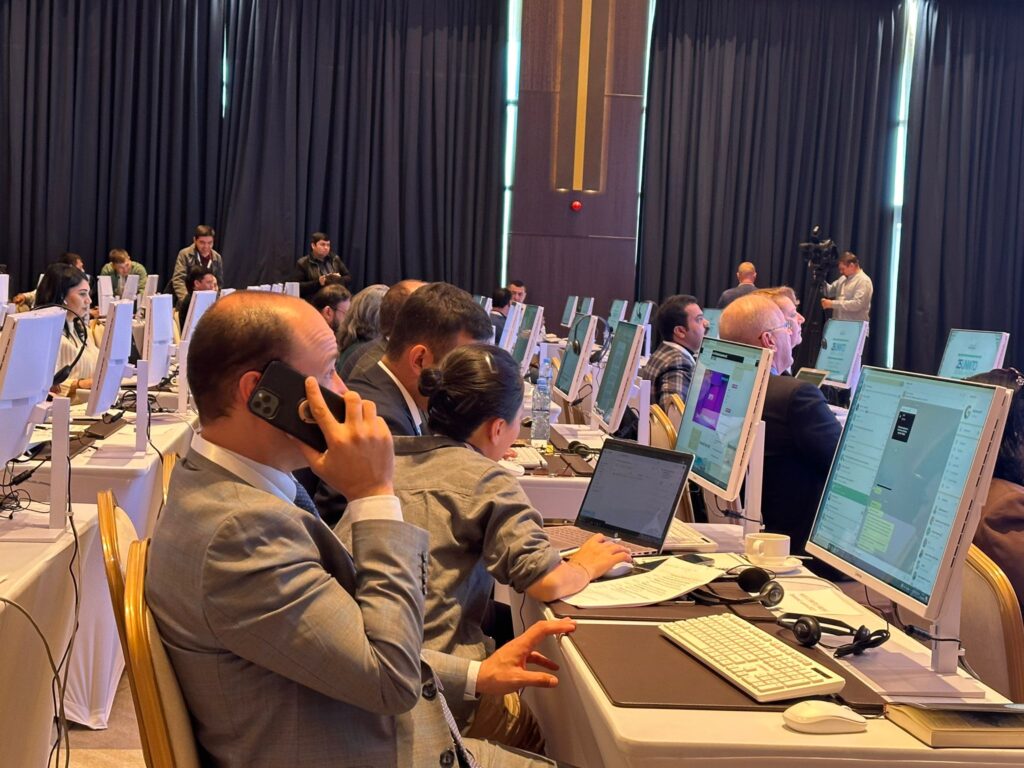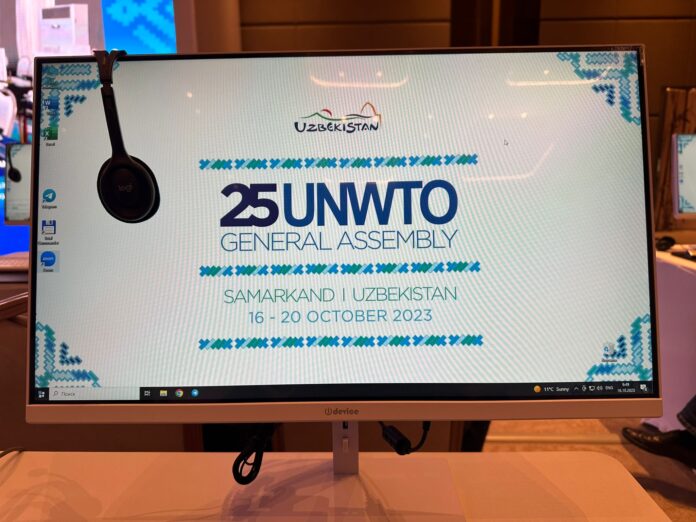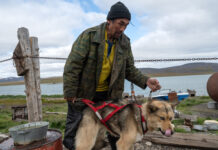16 October 2023, 25th UNWTO General Assembly, Samarkand, Uberkistan – As part of Uzbekistan’s effort to improve and modernize its economy, Uzberkitan is looking to strengthen its relations with China, its strategic partner, through foreign policy. By forging bilateral relations on the basis of equality, mutual respect and consideration of interests, the two countries hope to raise activity and commerce to improve the economy.
Over the last 30 years, both countries concluded 113 interstate and inter-governmental agreements, including the Treaty of Friendship and Cooperation between the Republic of Uzbekistan and the People’s Republic of China signed in September 2013.
Within the framework of the UN, Beijing supported resolutions initiated by the President of Uzbekistan on ensuring international cooperation for sustainable development in the Central Asian region for education, religious tolerance and tourism development. The Aral Sea was declared a zone of environmental innovation and technology in achieving the Sustainable Development Goals, and others.
In recent years, relations between Central Asian countries and China have been elevated to include heads of state. During the recent summit in Xi’an, China gave new impetus to both regional cooperation and the promotion of important joint projects with Uzbekistan.
Uzbekistan was among the first to support China’s One Belt, One Road megaproject aimed at strengthening international transport interconnectivity, developing broad trade, investment and humanitarian exchange. Uzbekistan and China have established diversified economic interaction to the tune of $8.9 billion, with China being one of Uzbekistan’s largest trade partners, accounting for 18% of the country’s foreign trade.

Economic Partnership
Joint strategic projects such as China-Central Asia gas pipeline, Kungrad soda plant and Dehkanabad potash fertilizer plant, modernization of Angren thermal power plant were established. The Peng Sheng industrial park with Chinese investment is established as free economic zone in Syrdarya, is where the largest concentration of investment projects with private Chinese capital in Uzbekistan. ZTE, an electronics manufacturer built the first production line for smartphones in Central Asia. The joint venture between Peng Sheng, Almalyk Mining and Metallurgical Plant launched AWP, a plant producing about two million valves and mixers per year using domestic raw materials.

Green Economy
Uzbekistan’s course to boost industrial and agricultural production, transition to a green economy, digital and innovative development, as well as the progress achieved in regional policy and foreign economic diplomacy have opened new opportunities for expanding areas of Uzbek-Chinese cooperation.
In June, an agreement was reached with China Energy to construct a one GW solar photovoltaic power plant in Kashkadarya and Bukhara. A project to build a wind farm with 111 wind turbines is implemented by Masdar (UAE) in Navoi region. The first wind generator with a capacity of 4.7 MW is installed from the Chinese company Goldwind. An agreement on cooperation with a consortium of Chinese companies Huaneng Renewables Corporation and Poly Technologies on construction of solar photovoltaic stations with a total capacity of 2,000 MW is constructed in Jizzakh and Tashkent.
Negotiations are underway with Chinese IT giant Huawei on the possibility of localizing the production of equipment for solar stations. According to Chen Jiakai, director of Huawei in Uzbekistan, the company already has experience in photovoltaics and energy storage for commercial as well as household consumption in the territory of Uzbekistan.
Transport and Logistics
During Chinese President Xi Jinping’s visit to Uzbekistan in 2016, a jointly built 19 km tunnel on the Angren-Pap railroad connecting the central regions of the country with the Fergana Valley was deployed. Multimodal cargo infrastructure via the Tashkent-Andijan-Osh-Irkeshtam-Kashgar highway is underway on a trilateral basis across China-Kyrgyzstan-Uzbekistan railroad. The economic impact will formalize the China-Central Asia-West Asia Economic Corridor, a key pillar of Belt and Road.
In his speech at the summit of Central Asian and Chinese leaders in Xian in May 2023, Uzbek President Sh. Mirziyoyev emphasized the task of raising living standards to combating poverty through bilateral socio-economic development. Over the last 40 years, China’s policy of reforms raised the standard of living for more than 800 million people. The level of poverty fell 70 percent from 97.5% in 1978 to 0.6% by the end of 2019.

Alleviation of Poverty
Uzbekistan prioritized socio-economic reforms and successfully alleviated poverty taking into account the Chinese experience, lifting 1 million people out of poverty in 2022. This year a separate anti-poverty program is rolled out in one of the districts of each province of Uzbekistan. With the participation of Chinese experts, 18 targeted socio-economic projects have already been prepared to reduce poverty in 14 districts of Uzbekistan.
“The two-thousand-year history of friendly exchanges and 30-year practice of mutually beneficial cooperation demonstrates that the strengthening of comprehensive cooperation meets the trends of the times and the fundamental interests of the two countries and peoples. Standing at the crossroads of the past and the future, we are full of expectations and confidence in the future of China-Uzbekistan relations,” said Chinese President Xi Jinping in his article for his visit to Uzbekistan in September 2022,
Uzbekistan and China view each other as reliable partners, interested in strengthening strategic partnerships to bring about mutually beneficial cooperation to new heights.
Abstract from Mr Zilola Yunusova’s paper,
Head of Department of the Center for International Relations Studies under the Ministry of Foreign Affairs of the Republic of Uzbekistan











